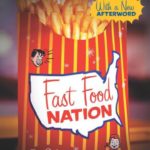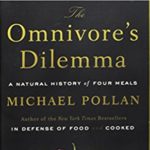 |
VS. |  |
What is a Plant Based Diet?
Two things about my own thinking struck me after reading these two books. One was my rather loose idea about a plant-based diet, and the other was my tendency to not be discerning enough is some instances. We really need to be careful about terminology, as it is often used to deceive us, and it is constantly evolving and changing over time. What do you think a ‘Plant Based Diet’ is? You might be surprised at the current trends in meaning…
I will begin with my own understanding of what a ‘plant-based diet’ really means, how the books define the expression, and how popular culture defines it. Then I will discuss the books’ stance on said diet within that cultural definition. Finally, I will give my opinion on how a plant-based diet affects the industrial food model (i.e. the unnatural processed foods that fill 95% of shelf space in American supermarkets).
The definition of a ‘plant-based diet’ sounds rather general to me, and I had always associated it closely with the idea of a ‘whole food’ diet, and/or contrasted it to a ‘processed food’ diet, modern food diet, standard American diet (SAD), etc. I would go as far as to say that it was in line with the guidelines of the Weston A. Price Foundation. I am probably not alone in this thinking. In my mind, it was a good expression.
Unfortunately, my associations, contrasts, and assumptions were dangerously incorrect, as a ‘plant-based diet’ is in fact used to represent a diet that consists of very little animal products, or none at all; thus being akin to vegan or vegetarian in its nutritional profile and sustainability. This is even more true when we consider how much many vegans and vegetarians cheat while dieting. Their religious fervor aside, most of them are simply on a plant-based diet, and not actually vegans or vegetarians.
Interestingly, the actual term ‘plant-based’ does not ever appear in either of the two books that I am reviewing here. Not once. That will however not stop me from answering the question about whether or not the authors are arguing for a plant-based diet. The diet, as well as vegan and vegetarian diets, are defined by their extreme, unnatural avoidance of animal foods, and the authors have much to say from that perspective.
Before I answer the above question we will turn to a couple of other sources to firmly establish the definition that I stated above. From the popular ‘Forks Over Knives’ people we have their definition (Imatome-Yun, 2017):
“A whole-food, plant-based diet is centered on whole, unrefined, or minimally refined plants. It’s a diet based on fruits, vegetables, tubers, whole grains, and legumes; and it excludes or minimizes meat (including chicken and fish), dairy products, and eggs, as well as highly refined foods like bleached flour, refined sugar, and oil.”
This is the definition that we shall hold in our mind. I think that the authors (Pollan, Schlosser, and also Campbell from ‘The China Study’) and others would be very happy with that definition. Although I prefer to use a bit more colorful language: this is a vegan diet that allows a little cheating.
Interestingly, just to once again highlight my previous confusion, we can note that even Campbell in ‘The China Study’ never gives a definition of the term plant-based diet, even though he uses it over a hundred times, and entwines it with ‘plant-based foods’ at many points. Plant-based foods is self explanatory, but that doesn’t help. Take for example this muddled sentence (Campbell, 1997): “In effect, we are comparing, within the Chinese range, diets rich in plant-based foods to diets very rich in plant-based foods.” (p. 75) Ironically, that muddled sentence made sense to me under my old mistaken understanding, where there was room to include significant (and sufficient) amounts of animal-based foods. However, Campbell does not have any such belief, as he mostly associates those terms with a vegan diet throughout his book; despite the contradiction in that muddled sentence.
I felt that Campbell was worth a mention, because Michael Pollan is similarly guilty of a muddled message; although he takes a different approach. Campbell’s vegan propaganda was vomited upon nearly every page, while Pollan’s agenda was more subliminal. I should not use the word agenda, as I am not completely certain of his intent in that book. In any case, the ‘subliminal’ message is the same. The book is arguing against the industrial processing of foods; however, in its careless attempt at doing so, it is definitely arguing for a plant-based diet. We will address Schlosser’s view a bit later.
I want to say that Pollan’s arguing for a plant-based diet is inadvertent and unintended. I really want to say that, because the vast majority of what he says is great. His assault on CAFOs (Concentrated Animal Feeding Operation) and the industrial food model is well done and much needed. He should be a hero for that alone; however, his heroism is completely undone by some catastrophically ignorant statements that are slipped in here and there throughout the book; statements that undermine everything. Take for example this statement (Pollan, 2010): “(Though originally designed as a healthy substitute for animal fats, medical researchers now think these trans fats are actually worse for our arteries than butter)” (p. 88). That is not a mistake that I have parenthesis within the quotes, as that is exactly how it is in the book, and I think that is very significant. The two false insinuations are already so bad, but to place it in parenthesis makes it sound even more ‘matter of fact.’ Let’s look more closely at the sins of that one quote:
- There is no way that Pollan should ever consider the idea of anything ‘substituting’ for animal fats, as there is absolutely no substitute. Humans must have them for optimum health, and he certainly must realize that. His statement is presented in a way that makes it seem desirable to find a substitute. It is not desirable.
- Those trans fats (vegetable oils) were never designed to be healthy – they were only designed to make money. The single motivation was and is profit. From cradle to grave, everything about vegetable oil (which his statement is referring to) is about profit. Pollan cannot be ignorant of that fact, and yet he imbues those business activities with a sense of good intent. There was never a moment of good intent.
- Implications. Even worse than propping up the intentions of the vegetable oil manufacturers is the implication that animal fats are not healthy. Implications are much more subliminal, planting doubt or false fact by circumventing the likelihood of challenge. He is planting seeds of doubt without you realizing it.
- And finally, about butter. He is implying that butter is one of the worst foods for our arteries. This is one of the worst false ideas that gets tossed around, and he feeds into it. Butter is probably the best fat that you can consume. Get yourself some good grass-fed butter and eat as much as you want.
How is it possible that he can spend a week with Joel Salatin on his farm and still be so ignorant? Perhaps Pollan, like so many others, is simply vulnerable to the influences of mass media, pop culture, and whatever trends might catch his attention. Herd mentality. Perhaps.
Sadly, while Pollan applauds the efforts of Joel Salatin and others like him, he does not believe it is realistic in a long-term big picture sort of way. Pollan seems resigned to accept the status quo of the industrial food model. He thinks pushing a plant-based diet will lead away from that, without understanding the reality of what he proposes. In fact, a ‘plant based diet’ as currently defined by the industry, will lead us further and further into the industrial food model, and lead us away from truly natural and healthy foods.
I have yet to mention Schosser’s book, Fast Food Nation, and that is because I did not find the same types of incongruities. The context is so very different from Pollan’s book, so it is an odd comparison. At the end of it all however, I do see the usefulness in the pairing these two books. Schosser, like Pollan, does a great job to attack CAFOs and the industrial food model; although he never uses the CAFO term in the book. Still it is very clear what he is talking about, and quite differently from Pollan, he is not supporting the industrial food model at all. Perhaps this is best expressed here (Schlosser, 2012):
“Any reform of the current system of industrialized agriculture will have to address the needs of independent ranchers and farmers. They are more than just a sentimental link to America’s rural past. They are a unique source of innovation and long-term stewardship of the land. Throughout the Cold War, America’s decentralized system of agriculture, relying upon millions of independent producers, was depicted as the most productive system in the world, as proof of capitalism’s inherent superiority.” (p. 266)
Schosser goes on, hammering away at the point that we must move away from centralized, industrialized farming. This is in stark contrast to Pollan, and a very pleasant surprise, considering that his context is the fast food business.
Equally surprising is that he shows how even a beacon of the industrial food model (fast food businesses), can indeed exist without the industrial food model, using the In-N-Out burger chain as an example (Schosser, 2012, p. 259). It is not his only example either.
Schosser is not perfect, and many errors (similar to Pollan’s) are passed along in his book; however, they are leveraged to attack the industrialized food model of the fast food business, and nowhere does he angle towards supporting a plant-based diet. It does look like that at times, when he is quoting correlations between meat consumption and disease, but he is not categorically blaming meat. He talks about how to save the beef industry with real grass-fed beef, and he believes it can be done. He is promoting ‘real’ meat. Schlosser points a way forward; a way towards real food and away from the industrial food model and plant-based diets. Away from Pollan’s status quo.
In the end, Schlosser and Pollan are opposed to each other with regard to a plant-based diet; though again, they do not actually use that term. They both rage against the industrial food model, but Pollan’s somewhat subliminal message is promoting it. A plant-based diet is unsustainable by any means, as Pollan himself points out by detailing the myopic monoculture of corn and its seemingly infinite contortions and applications in Frankenfood. That we have such a word now – Frankenfood – seems perfectly apt for our modernized food industry. Most ironically, you will find that people purporting to be on a plant-based diet are highly likely to be violating the first tenet of that definition (whole foods), as they are almost certainly consuming Frankenfood. I need no statistics to prove that statement, as a quick glance at any vegan/vegetarian food section (itself paradoxical) will confirm that it is true. The products are there because the people are eating them; and unfortunately, vice versa.
References
- Imatome-Yun, N. (2017, January 3). Plant-Based Primer: The Beginner’s Guide to Starting a Plant-Based Diet. Retrieved July 21, 2017, from https://www.forksoverknives.com/plant-based-primer-beginners-guide-starting-plant-based-diet/#gs.Bgl__78
- Pollan, Michael. (2016). The Omnivore’s Dilemma: A Natural History of Four Meals. Penguin Publishing Group. Kindle Edition.
- Schlosser, Eric. Fast Food Nation: The Dark Side of the All-American Meal. Houghton Mifflin Harcourt. Kindle Edition.
- Morell, S. F. (2010, February 03). Omnivore’s Dilemma by Michael Pollan. Retrieved July 14, 2017, from https://www.westonaprice.org/the-omnivores-dilemma-by-michael-pollan/








